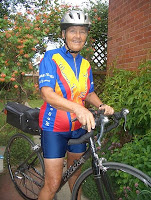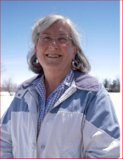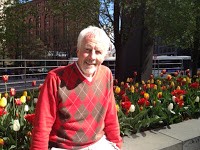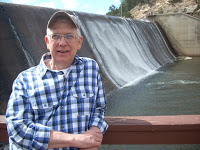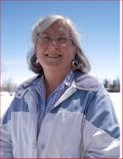I started out in the sport of tennis later in life. I discovered that it took very little time away from my three young children to play a couple of sets, not a great deal of expensive equipment, and there were plenty of courts around town, the closest to my home here in Denver being at the time in City Park. This, as well as the fact that I loved it. I started out taking lessons at City Park courts from an old man named Mr. Harper. He could hardly move, but he knew the right concepts and how to teach them. I grew to respect his teaching greatly.
Through the 1970s and into the 1990s I played many tournaments and leagues as well as for no particular reason at all. I think I still have a few dust-covered trophies in a cabinet somewhere to remind me of the competitions.
The greatest benefit of playing tennis has been the many friends I made. When I retired in 1998 I decided to get serious about my game and joined the Denver Tennis Club. This is a club for tennis lovers–no swimming, no indoor facilities except locker rooms and sign-in desk and directors’ offices and a place to sit and relax. There is no bar at this club, just a coke machine. The focus is on the 12 outdoor courts located in the heart of Denver where it has been since 1928.
Many wonderful things have happened due to my passion for playing tennis. Perhaps the best of these was my participation in the 1990 and 1994 Gay Games. The best tennis experience for me was in Gay Games III in 1990. Many athletes in just about every sport along with various GLBT choruses descended on the city of Vancouver, British Columbia, that summer of 1990. Much preparation and practice went into sending about 300 LGBT athletes from Colorado to this Gay Games and Cultural Festival III.
Our infant tennis team was not well organized and had not had much chance to practice together. But a friend I had know for a number of years, a former H.S. tennis coach, had asked me if I wanted to go to the games and play doubles with her. Of course, I jumped at the invitation. Mind you, one does not have to qualify. You just get your name on the roster and go.
Team Colorado–all 300 of us–were quite impressive when we finally all stood together in our uniform sweat suits at the ceremonial start of the event–a parade of the 7,300 participants representing 39 countries and 27 sports. The US–which had hosted the first and second quadrennial event, Gay Games I and II, had by far the largest contingent. But many came from Australia and Germany which were soon to become home of future Gay Games events. Canada, of course had a huge interest this being the first games on their side of the border.
The Province, a conservative Vancouver newspaper, writes on its editorial page:
“Almost a year ago, we called these gay games ‘silly.’ What’s next? we asked. Bisexual games? Asexual games? What, we queried, does sexual orientation have to do with the high jump? Since then, we’ve been educated. We’ve learned that these games are intended to build bridges, strengthen community and bolster self-esteem. Members of groups that bear the brunt of society’s ignorance and fear need to make special efforts to support each other. And sometimes they need to stand up and be counted. “It is not for us to question — so long as others are not being hurt — how the homosexual community chooses to celebrate itself and to educate us, any more than it is our place to question how native Indians or blacks or women choose to define and redefine themselves.” “What of the AIDS spectre? AIDS as a sexual issue is no more relevant to these games than it is to a convention of heterosexual mountaineers or carpet layers. These games are, above all, about having fun. It isn’t often we get to have fun and, at the same time, learn about tolerance, compassion and understanding. B.C. residents should go out to some of the events of the 1990 Gay Games and Cultural Festival.”*
Vancouver is a wonderful city and we had a ball. Another comment that sticks in my mind was from another article in The Province. An event called Seafest was going on in the city at the same time as the games. The newspaper described Seafest as a drunken brawl with loud, rowdy, trash dropping people from all over the world attending. It goes into some length describing the unruly behavior of the Seafest participants. The article continues.
“The GAY GAMES also brought in Zillions of men and women who spent lorryloads of money and indeed cluttered up the sidewalks, but who picked up their garbage, laughed a lot, said ‘excuse me’ and ‘good evening’ and ‘thank you’ a whole ton and, if they got drunk and disorderly, at least had the good taste not to do it under my bedroom window. In fact, the only disconcerting noise in the West End during the games was created by the yahoos who cruised the streets in their big egos and macho little trucks while shouting obscenities at anyone they deemed to be gay.”*
Gay Games III was in every way a memorable experience for me personally. Gill was there with me cheering me on. Most of our time however was spent sight-seeing and enjoying watching the sports events. It was all quite new to me–all these gay people together. The men competing on the croquet lawn with their exotic hats and chiffon gowns flowing in the breeze as they wielded their mallets– that image will be with me forever.
I managed to win a silver medal in the tennis competition. All the tennis awards were presented by a gay man whose name I forget. I do remember that he was an openly gay member of Canada’s parliament. Of course he was out. This was Canada.
Four years later I would participate in Gay Games IV in New York. I was able to share this experience with my daughter Lynne who lived not far from NY City in New Haven, Connecticut. This is when my lesbian daughter came out to me. When I told her I was coming to New York to play tennis in the Gay Games she replied Oh good!! We’ll go together. I’m going to participate in the games too, Mom. I’m playing on the Connecticut women’s soccer team.” Yes, that was her coming out statement to me! We did enjoy that time together and watched each other in our respective competitions and cheered each other on.
The New York event drew 12,500 participants from 40 countries. It was definitely a proud and memorable moment for me when I found myself marching with my daughter in a parade of 12,000 LGBT athletes through Yankee stadium to the cheers of tens of thousands of supporters and spectators.
I do like the sound of that word “athlete.” It is important to note that the event was never intended to be focused on athletic ability alone, however. In the words of Olympic track star Tom Waddell whose inspiration gave birth to the games in the 1980s, “The Gay Games are not separatist, they are not exclusive, they are not oriented to victory, and they are not for commercial gain. They are, however, intended to bring a global community together in friendship, to experience participation, to elevate consciousness and self-esteem and to achieve a form of cultural and intellectual synergy…..We are involved in the process of altering opinions whose foundations lie in ignorance. “
I have not attended another Gay Games since 1994. But the event continues in various parts of the world and has forever etched it’s name in the annals of sporting events.
I am still playing tennis 20 years after the NY Gay Games–no tournaments, just an old ladies’ league called super seniors and with friends two or three times per week at the Denver Tennis Club. I suppose the day will come when I can no longer hit that ever-so-satisfying backhand down the line winner, but I’m not planning on that happening any time soon. As far as I’m concerned I will keep getting better until I can’t hear those three little words anymore–game,set, match!
Cockburn, Lyn. “Some Games can be a real education.” Pacific Press Limited, The Province, Sunday, August 12,1990.
About the Author
Betsy has been active in the GLBT community including PFLAG, the Denver women’s chorus, OLOC (Old Lesbians Organizing for Change). She has been retired from the Human Services field for about 15 years. Since her retirement, her major activities include tennis, camping, traveling, teaching skiing as a volunteer instructor with National Sports Center for the Disabled, and learning. Betsy came out as a lesbian after 25 years of marriage. She has a close relationship with her three children and enjoys spending time with her four grandchildren. Betsy says her greatest and most meaningful enjoyment comes from sharing her life with her partner of 25 years, Gillian Edwards.
